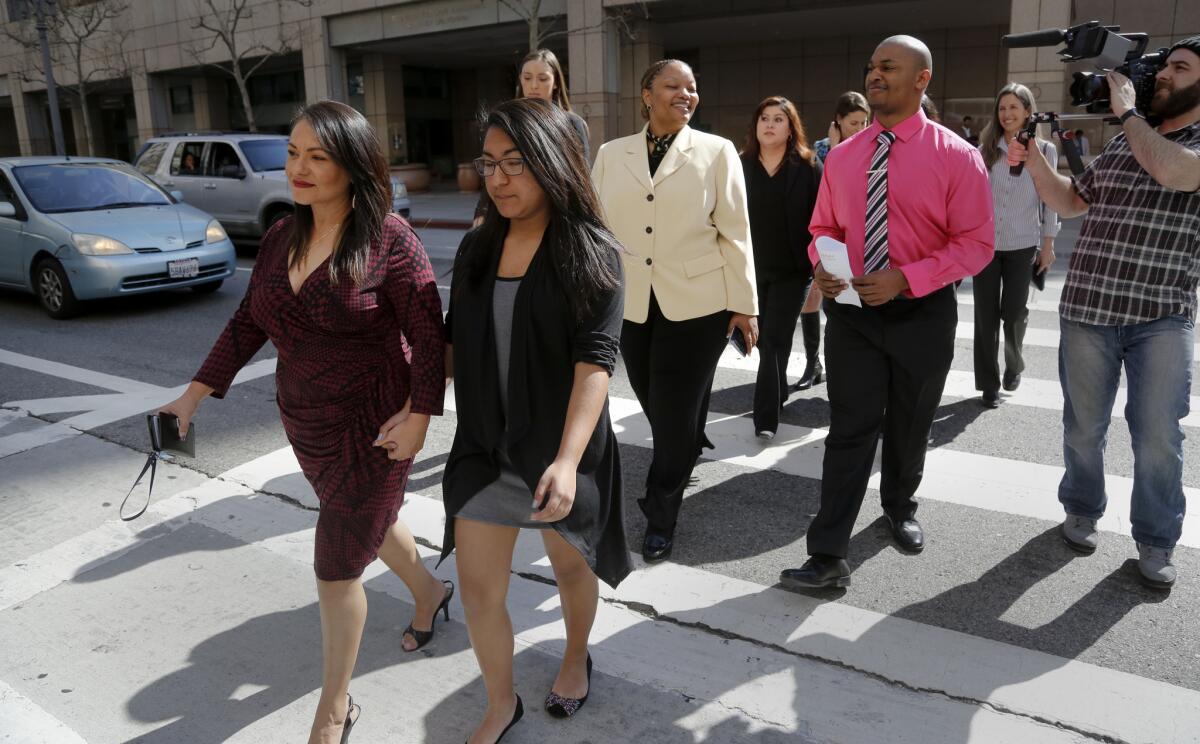Judges weigh arguments over teacher vs. student rights in landmark tenure lawsuit

Most of the nine student plaintiffs in Vergara vs. California walk away from the 2nd District California Court of Appeal in Los Angeles after the first morning of oral arguments.
- Share via
An overflow crowd at a state appellate courtroom in Los Angeles listened attentively Thursday to the latest round in an ongoing argument about the intersection of students’ rights and teachers’ rights.
“There probably isn’t anybody in this room who didn’t have a bad teacher sometime,” presiding Justice Roger Boren remarked to the court — a point that may help explain why the case has drawn so much attention.
A judge’s 2014 ruling in the case, Vergara vs. California, holds that several key job protections for teachers are so harmful to students that they deprive children of their constitutional right to an education.
Lawyers representing the state of California and its powerful teachers unions argued Thursday before a three-judge panel that the decision should be reversed and that the laws in question do not violate students’ rights.
The justices are reviewing the ruling of L.A. County Superior Court Judge Rolf Treu that nullified the state’s system of awarding strong protections for teachers — including tenure, which takes effect at the end of their second year on the job.
These statutes, Treu concluded, make it almost impossible to fire a veteran, unionized teacher. The result, he wrote, is that bad teachers remain in the classroom, hurting students, especially black and Latino students and those from low-income families.
Treu’s decision would end tenure as well as the practice of “last-in, first-out,” which typically results in districts laying off less-experienced teachers during budget cuts — regardless of how well they do in their job.
And Treu also threw out rules that provide teachers a longer and more complex system to challenge dismissals.
First to take on Treu’s ruling was Deputy Atty. Gen. Nimrod P. Elias. He said the trial judge erred in not balancing the benefits of state rules with any drawbacks caused by them.
Yes, there are bad teachers who have rights under California law that can prolong their time in front of students, he said. But these job protections also help the state attract and retain high-quality teachers, a benefit to students.
He argued that the current laws are being applied in a constitutional manner, without any discrimination.
This point brought the first question from one of the 2nd District Court of Appeal panelists, Associate Justice Brian M. Hoffstadt. Regardless of intent or wording, doesn’t “real-world impact” matter? If these statutes were harming students, could not a case be brought against them?
Elias conceded the point, but said that no rigid connection between the statutes and harm to students had been proved.
Attorney Michael Rubin was up next, representing the California Teachers Assn. He expanded on Elias’ points, and also asserted that the other side relied heavily on anecdotes of students describing a bad teacher.
That wasn’t enough to demonstrate that the teacher protections are unconstitutional, he said.
Arguing on behalf of the original decision was Theodore J. Boutrous Jr., who is also a lead attorney representing Apple as it tries to resist government efforts to unlock the iPhone used by one of the terrorists in the mass shooting in San Bernardino.
Boutrous called laws protecting teachers “pernicious” and “harmful” to students in L.A. and across the state.
But Associate Justice Judith Ashmann-Gerst quickly cut him off to question an argument in his legal brief — a comparison of the Vergara decision to an earlier case in which advocates successfully sought more money for schools in low-income areas.
In that case, it was clear that wealthier communities were providing much more money to their schools and that something needed to be done about the inequities for less well-to-do students, she said.
A case involving teacher-employment rules seemed different, she suggested.
Boutrous disagreed. The common ground, he said, was that in both cases there was a practical, harmful effect on students — and that is what matters in deciding whether the teacher protections are legal under the state constitution.
Justice Hoffstadt noted that some districts seem to manage well under the current laws.
Boutrous responded: “There are still problems even in those school districts.” He insisted that everyone knows what a grossly ineffective teacher is and that everyone knows they remain in the system.
He reminded the justices that Judge Treu had written that the status quo “shocks the conscience.”
He called California an “outlier” compared with other states. Doing the right thing for students was an easy call, he said.
“It’s two plus two equals four,” he said, adding that students are depending on the court. “This is make-or-break for their lives and our society.”
After the hearing, each side expressed optimism.
Rubin, the teachers’ representative, said he believed the justices’ questions focused on the law rather than on responding to anecdotal accounts of harm caused by individual bad teachers. He added that the laws may be imperfect and could be improved, but they are not unconstitutional. And it is up to the Legislature to decide how and whether to make them different.
Boutros also said he felt good about how things went.
“These appellate arguments, you can never draw too much from the questions,” he said. “They’re trying to get information.... I was very pleased with the fact that the judges knew the record here, knew the key issues. They asked very good questions on both sides.”
[email protected] | Twitter: @howardblume
[email protected] | Twitter: @Joy_Resmovits
MORE EDUCATION NEWS
The problem with slut shaming in schools
University of Missouri fires instructor after student run-ins
L.A. schools have given up the last of their Defense Department-issued rifles
More to Read
Sign up for Essential California
The most important California stories and recommendations in your inbox every morning.
You may occasionally receive promotional content from the Los Angeles Times.











